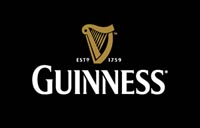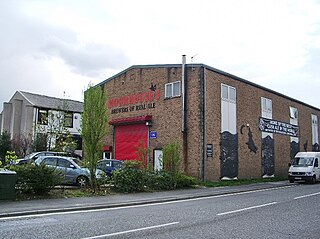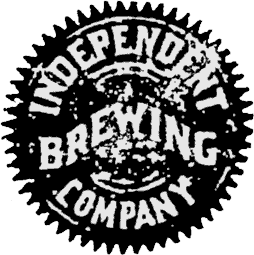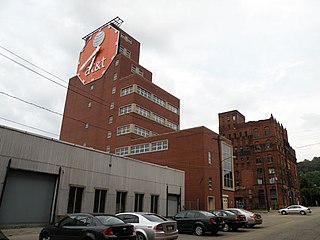
Newcastle Brown Ale is a brown ale, originally brewed in Newcastle upon Tyne, England. Launched in 1927 by Colonel Jim Porter after three years of development, the 1960 merger of Newcastle Breweries with Scottish Brewers afforded the beer national distribution and sales peaked in the United Kingdom in the early 1970s. The beer underwent a resurgence in the late 1980s and early 1990s with student unions selling it. Brewing moved in 2005 from Newcastle to Dunston, Tyne and Wear, and in 2010 to Tadcaster. In 2017, the Heineken Brewery in Zoeterwoude, the Netherlands, also began production. As of 2019, it is brewed as well by Lagunitas Brewing Company in Petaluma, California, and Chicago, Illinois, for the American market.

John Smith's Brewery in Tadcaster, North Yorkshire, England, produces beers including John Smith's, the highest selling bitter in the United Kingdom since the mid-1990s.

Wychwood Brewery was a brewery in Witney, Oxfordshire, England, owned by Marston's. Hobgoblin, a 5.2% abv brown ale, was the company's flagship brand.

Pittsburgh Brewing Company is a beer company headquartered in the Lawrenceville neighborhood of Pittsburgh, Pennsylvania, United States, best known for producing brands such as Iron City Beer, I.C. Light Beer, I.C. Light Mango, Old German, and Block House Brewing. Until August 2009, all production was conducted at its Lawrenceville facility. From August 2009 to 2021, their products were contract brewed at City Brewing Company in the facility once produced Rolling Rock. On February 4, 2021, Iron City Beer's Instagram account announced that Pittsburgh Brewing Company would resume production of its own product in a new production brewery in Creighton, Pennsylvania, in the original Pittsburgh Plate Glass Company plant. At its opening, the facility is capable of producing 150,000 BBLs of beer annually.

St. James's Gate Brewery is a brewery founded in 1759 in Dublin, Ireland, by Arthur Guinness. The company is now a part of Diageo, a company formed from the merger of Guinness and Grand Metropolitan in 1997. The main product of the brewery is Draught Guinness.

Latrobe Brewing Company was founded in 1893 in Latrobe, Pennsylvania as part of the Pittsburgh Brewing Company. Forced to close in 1920 due to prohibition, it was purchased by the Tito brothers and reopened in 1933 selling “Latrobe Old German” and “Latrobe Pilsner” beers. The year 1939 saw the introduction of Rolling Rock beer and Latrobe became one of the largest breweries in the United States. It was purchased by Labatt Brewing Company in 1987, which in turn was purchased in 1995 by the Belgian brewing conglomerate corporation Interbrew, which merged later into InBev in 2004.
City Brewing Company is a large brewery located in La Crosse, Wisconsin, USA. It is the former flagship facility of the Heileman Brewery, and can brew up to 7 million barrels of beer a year. Its twin-stream brewhouse can manage 16 brews of 1,100 barrels per day at the same time.
Beer is a popular alcoholic beverage in Turkey, mostly lager type beers.

Moorhouse's is an independent brewery founded in 1865, by William Moorhouse in Burnley Lancashire, England, as a producer of mineral waters and low-alcohol beers known as hop bitters. It first produced cask ales in 1978.

F.X. Matt Brewing Company is a family-owned brewery in Utica, New York. It is the fourth oldest family-owned brewery in the United States, having brewed beer since 1888. Its most popular product is the Saranac line of beers. It also sells soft drinks such as root beer and ginger beer.

Anderson Valley Brewing Company is a brewery founded in 1987 in Boonville, California. Its name is derived from its Anderson Valley location in Mendocino County.
Heineken N.V. is a Dutch brewer which owns a worldwide portfolio of over 170 beer brands, mainly pale lager, though some other beer styles are produced. The two largest brands are Heineken and Tecate; though the portfolio includes Amstel, Fosters, Sagres, Cruzcampo, Skopsko, Affligem, Żywiec, Starobrno, Zagorka, Zlatý Bažant, Laško and Birra Moretti.

The Malt Shovel Brewery is an Australian brewery owned by Lion, a subsidiary of the Japanese conglomerate Kirin. It is located in Camperdown, New South Wales. Malt Shovel is best known for its James Squire range of beers. The beer is named after the convict turned Australia's first brewer James Squire, who also went on to grow Australia's first hops and is said to have created Australia's first commercial brewery.

Stones Brewery was a brewery founded in 1868 by William Stones in Sheffield, West Riding of Yorkshire, England, and purchased by Bass Brewery in 1968. After its closure in 1999, its major brand, Stones Bitter, has continued to be produced by the Molson Coors Brewing Company.

The Independent Brewing Company of Pittsburgh (IBC) was a conglomerate of breweries, formed by the merger of fifteen Pittsburgh breweries in 1905.

Wharfedale Brewery is a brewery situated in Ilkley in Wharfedale, West Yorkshire, England, on the edge of the Yorkshire Dales National Park. Two, now defunct, breweries in Yorkshire have previously used the Wharfedale name; first in Wetherby in the 1756 and again in Grassington in 2003. The name was resurrected for a third time, further down the River Wharfe, in 2012 by a group of 16 real ale enthusiasts, many of whom are former chairmen of Ilkley & District Round Table.

Located on the Duquesne Brewing Company building in Pittsburgh, Pennsylvania, the Duquesne Brewery Clock was the largest single-face clock in the world when it was installed in 1933. Over the years its face has been used to advertise numerous brands, beginning with Coca-Cola.

The Christian Schmidt Brewing Company was an American brewing company headquartered in Philadelphia, Pennsylvania. Founded in 1860, it was the largest brewing company in the history of Philadelphia, producing nearly 4,000,000 barrels of beer a year in the late 1970s. When it closed in 1987, it marked the first time in over 300 years that there was no brewery operating in Philadelphia.
Fort Pitt Brewing Company was a major brewery in Pittsburgh, Pennsylvania, from 1906 to 1957, which brewed Fort Pitt Beer and other regional brands. Mark Dudash, a Pittsburgh area attorney and owner of Duquesne Brewing Company, revived Fort Pitt Brewing, and introduced a new Fort Pitt Ale in 2014. The new Fort Pitt Ale is crafted in the spirit of the brewery established in Fort Pitt in 1765, and is formulated as an ale using two row malt, caramel, and English hops. The company had manufacturing plants in Sharpsburg, Pennsylvania and Jeannette, Pennsylvania.























